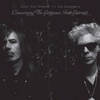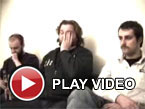Jozef van Wissem & Jim Jarmusch, "Concerning the Entrance into Eternity"
 I am not at all surprised that Jim Jarmusch has finally made an album, but given his past links to folks like RZA,  Mulatu Astatke, and Tom Waits, I did not exactly expect his musical debut to be a duet with a Dutch lutenist.  As it turns out, however, Jozef van Wissem turns out to be a very comfortable and effective foil for Jarmusch's rather abstract guitar work.  While this isn't a deep or substantial album by any means (despite the grandiose implications of the Swedenborgian title), it is nevertheless quite a warm and likable one and it never sounds at all tossed-off or overwrought.
I am not at all surprised that Jim Jarmusch has finally made an album, but given his past links to folks like RZA,  Mulatu Astatke, and Tom Waits, I did not exactly expect his musical debut to be a duet with a Dutch lutenist.  As it turns out, however, Jozef van Wissem turns out to be a very comfortable and effective foil for Jarmusch's rather abstract guitar work.  While this isn't a deep or substantial album by any means (despite the grandiose implications of the Swedenborgian title), it is nevertheless quite a warm and likable one and it never sounds at all tossed-off or overwrought.
This is not the first time that Jarmusch and van Wissem have worked together, as Jarmusch contributed guitar to last year's The Joy That Never Ends.  That, of course, goes a long way towards explaining why this duo seem so at ease interacting with each other musically.  That also goes a long way towards explaining the basic stylistic thrust of this effort: it basically sounds like a Jozef van Wissem album, but slower and more spacious.  Josef's simple, ringing melodies are generally what hold the songs together and give them direction, but he leaves lots of room for Jarmusch to provide depth and color.  There are some exceptions, however.  The big one is the 9-minute "The Sun of the Natural World is Pure Fire," as van Wissem keeps his contribution fairly minimal to allow Jim's roiling, snarling howls of feedback and dissonant bent notes to take center stage.  To his credit, Jarmusch has no trouble making that work, unleashing a controlled cacophony that would not sound at all out of place at a Spiritualized concert.  Jim returns the favor for "He is Hanging by his Shiny Arms," allowing van Wissem to unfold a very pleasant and trill-heavy melody on his own, stepping in only near the end to cryptically recite several lines from a poem by St. John of the Cross.
As skilled as Jarmusch is at harnessing and sculpting distortion and feedback, the success is still largely dependent on the strength of van Wissem's framework.  Aside from the aforementioned "Shiny Arms," the best piece is probably the title one, as Jozef does a beautiful job dynamically switching back and forth between simplicity and rich harmony throughout.  There aren't any particularly weak compositions among these five pieces though, as even the more dirge-like ones ultimately catch fire or offer some sort of subtle delight.  The album's sole flaw seems to be that some of the songs tend to explore just one motif for a while, then just kind of abruptly end.  That certainly betrays vamp/improvisational origins, but the  pieces rarely overstay their welcome and the spontaneous/organic feel of the interactions make that seem like a pretty favorable trade-off.  I'm not even tempted to balk at the numerous allusions to Christian mysticism that would normally seem hugely out of place for such an intimate, loose, and unpretentious affair.  Perhaps I am just predisposed to like these two, but the themed and evocative titles seem to actually elevate this pleasant song suite into something that feels more meaningful and enticingly mysterious than it otherwise would have.
Samples:
- Concerning the Entrance into Eternity
- The Sun of the Natural World is Pure Fire
- He is Hanging by His Shiny Arms, His Heart an Open Wound with Love
 
 
 



